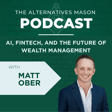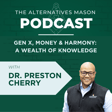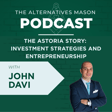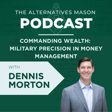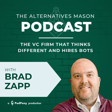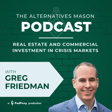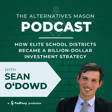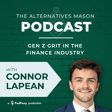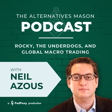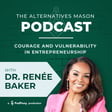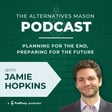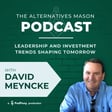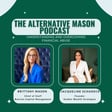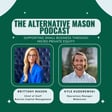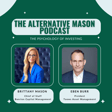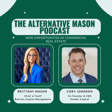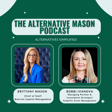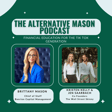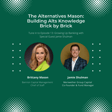Become a Creator today!Start creating today - Share your story with the world!
Start for free
00:00:00
00:00:01

The Alternatives Mason: Building Alts Knowledge Brick by Brick | Episode 20 | Building Your Career and Banking on Yourself with Luke Lloyd
How can a young professional build a network? Should they invest in the markets, or crypto? Luke Lloyd shares his journey from a blue-collar upbringing to building financial strategies for today’s economy. He talks about early lessons with his dad, the power of stepping out of comfort zones, and the importance of real connections and mentorship.
We also explore new investment trends like AI, cryptocurrency, and sports investing, along with tips on staying balanced through mindfulness. Whether you're new to finance or experienced, this episode offers practical advice to grow your career and navigate the changing market.
Connect with us below!
Transcript
Introduction and Background
00:00:00
Speaker
I was the annoying guy in class that all the professors would get upset with because I wasn't paying attention. I was trading stocks. Welcome to the Alternatives Mason podcast. With host Brittany Mason, Chief of Staff at Bonnerian Capital Management, you'll learn how to build alternatives knowledge brick by brick. Bonnerian Capital Management uses technology to help independent advisors scale and educate themselves on alternative investments. And since education is such a big piece of what we do, we are excited to kick off the series to dive into the nits and grits of the alternative space.
00:00:35
Speaker
Hello, everyone. It is Brittany Mason, your host of The Alternative Mason, and we are here with Season 2 and ready to build your knowledge, all knowledge brick by brick. Today, I have a special guest with us, Luke
Career Beginnings and Inspirations
00:00:50
Speaker
Lloyd. He is a seasoned financial professional, a wealth advisor at Strategic Wealth Partners in Cleveland, Ohio, where he specializes in investment strategy He began his career early, starting in his business, his first business at only 17 years old, and later deepening his understanding of economics and finance while serving as student body and president in college. His move to New York City afforded him the opportunity to work at CNBC alongside influential Wall Street traders, including Mark Tepper and an advocate for capitalism and free markets. Luke shares his financial expertise through appearances on networks like Fox Business and Bloomberg,
00:01:27
Speaker
and his insights have been featured in prominent publications such as the New York Times and Forbes. It is such an honor to have you here today, Luke. Thank you so much. You didn't have to read all that, Brittany. I mean, that's a lot. No, I mean... Like you said, I got to know some backgrounds, I guess, right? And the background of you, like we're talking about being in Miami compared to me in Cleveland, I am jealous about that. Well, you know, I mean, I am a Midwest girl at heart. I, you know, grew up in Indiana, but, you know, I do like my warm weather. and like my beach, what can I say? But I do get back i do too yeah i get back to the Midwest every chance that I that i get. you know so But hey, I had to take a moment to brag on you a little bit. I mean, I'm just so excited to have you on as our first guest of season two of the Alternative Mason. So you know we're just excited to have you and you know be a sponge and learn all we can from you on this episode.
00:02:19
Speaker
Well, I learned just as much when I do these things, right? It really, I enjoy these podcasts or I enjoy any kind of media, whatever it be, because it helps me really think about why I think a certain way or, you know, especially when we come into these things, like we didn't do any preparation, right? We didn't come in saying, oh, here's all the questions we're gonna ask. Like it helps me think about why I believe what I believe. And it helps me actually think on the spot about, you know, new things. So actually I learned just as much doing these.
00:02:47
Speaker
then ah maybe hopefully the viewers get out of sharing the experiences that I've been through because I don't believe there's any kind of expert that's out there. Once you get, especially in this industry, when you think you're an expert, you get humbled very quickly.
Insights on Finance and Investing
00:03:00
Speaker
So I'm always just a student, just like everybody else, right?
00:03:03
Speaker
I love that. That is such a great perspective you know to so look at things. and you know As our our listeners know, my background is very different. you know I only came into the financial industry only in the last three years, but it has been such a great ride. and um you know so A lot of our listeners, some of them may have a lot of financial knowledge, some of them you know, are just stepping into this world. But finance is for everyone. And so I really want to learn more ah about your background and what inspired you, you know, to get into business at such a young age. We're only 17 when you started your first business.
00:03:41
Speaker
ah How long do we have? but ah Really, it starts where I grew up. right You have to understand the atmosphere, the people, the environment that I grew up in, and that's really blue collar Southeast Ohio coal mines, steel mill, you know people that were just extremely hard workers that loved their families.
00:04:02
Speaker
The nuclear family, religious religion was a huge part of it. All of that, the old school JD Vance, frankly, mentality of his story is similar to how I kind of grew up or where I grew up in that kind of area. right so When you grow up in that kind of area and you see people working their butts off for really just pennies in the big scheme of things, theyre working their butts off um to provide for their families, making income to put food on the table. so When you grow up in that environment, you start to think about what is money?
00:04:31
Speaker
you know what what What can money do for me? What can money do for the world? How does money flow throughout the economy? um And I grew up in a very middle class family. right um We were had more than a lot of people around the area, but we were in by no means rich or wealthy. We were very middle slash middle upper class compared to the area. So when we had a little taste of being able to go out to dinner a couple of times a week or taking one vacation a year when no one else was taking take take a vacation,
00:04:58
Speaker
Um, it kind of sparked something in me, like but like, let's, let's dig a little bit deeper in this whole thing. So when I got to high school. my dad worked at a bank when he worked at a bank ah he had me do his summer internship i think of was when i was ah junior junior in high school or senior in high school he had me do this like small little internship basically working for him for free and peanuts right yeah um and you would have me carrying these big large boxes up and down the stairs of all these like he was on cybersecurity itc
00:05:35
Speaker
Right, so I said dad. i'm I'm not doing this. I'm quitting I will make money if you want me to have a job or want me to do something I will go make money somewhere else so what I did is I started going down to garage sales I used to went down to like these estate sales, and I'd buy these items and start selling them on eBay, so um It was kind of the Gary Vaynerchuk kind of way of doing things where he says go to garage sales buy things cheap and someone eBay and flip and make money so that kind of got me interested in what I Bigger thing I could do within that realm. So what I did was i actually I developed a drop shipping business on if you've heard of that Yeah, but drop shipping is where you basically connect a broker figure the brokering You know items you find a supplier you sell the item through ah ah another means whether it's Amazon or eBay You mark up the item maybe 15 or 20 percent and you make the margin in between So actually, I did pretty well heading into college with that business. It gave me enough money to basically start allocating and investing in into the stock market. So once you get a little bit of money at a younger age, you start investing in stocks and you make 10 or 15 grand in like a couple months in stocks, you get addicted to it. Almost a gambling addiction to it. yeah you get But then you also get humbled very quickly because the only way you turn $20,000 into $30,000 in a couple months is if you take a lot of risks. So yeah throughout my freshman, sophomore years of college, I was the annoying guy guy in class that all the professors would get upset with because I wasn't paying attention. I was trading stocks.
00:06:58
Speaker
And yeah I remember losing my portfolio from $30,000 down to $10,000, losing $20,000 of my hard-earned money because I had no knowledge about the stock market. I had no knowledge about finance. I had no knowledge about technical fundamental analysis. right So I did that for the first couple of years of college. I quit baseball. I played college baseball for a year. I quit baseball. I joined Student Senate, um which was sounds nerdy now. But that got me on the board of trustees. When I was on the board of trustees, I met a guy, Nick DeOgan, who was editor-in-chief of CNBC.
00:07:26
Speaker
Being editor-in-chief of CMBC, he said, Luke, if you have anything, let me know. I'll be glad to to help you out. So I emailed Nick my junior year of college. He said, hey, I'd love to be around all the Wall Street guys. I like to trade stocks. I like to invest. ah Can you get me around these guys? He's like, Luke, I wish you would email me a week before because our internship window closed.
00:07:42
Speaker
Um, I'm like crap, there goes my opportunity. Another week goes by. He's like, Luke, I pulled some strings. I got you in. So I ended up moving to New York city. This is back in 2018. I am only 27.
Networking and Career Advice
00:07:52
Speaker
Uh, beard helps me out a little bit, but in 2018, uh, I moved out to New York city. I was around all the wall street guys, including Mark Tepper. Who's my current boss.
00:08:03
Speaker
Interning out there for four months, I was a quantitative data analyst, but I take out guys to dinner, become friends with them, smoke cigars, go to Club Mac and Nudo. I was the annoying intern that jumping from everybody interviews myself. So after that, um I have joined Mark. I stayed in touch with Mark because he was an Ohio boy. um I was an Ohio boy and he led me up here to Cleveland, Ohio, coming from Southeast Ohio. I know drove three hours north, moved up here about five and a half years ago.
00:08:29
Speaker
It's been a fun ride ever since. Again, Socrates' way of thinking, I'm always a student. No matter how old you are, no matter how young you are, you're always a student. You always have mentors. I've had a lot of great mentors like Nick, like Mark, like a couple other people that I haven't mentioned yet that have greatly helped me out through education, ah through giving me opportunities. And the key in life, as you know, is taking advantage of opportunity.
00:08:50
Speaker
right So I know that's a long story about my kind of background and path. ah There's obviously details I've missed in between, but that's generally how I'm doing what I'm doing. No, my mind is blown. Wow. What a story. And no, I did not realize how young you are. Oh, my goodness. You're right. The beard does does help. So, wow. I mean, yeah, I have so many questions. I mean, first, what if you were looking back at your your younger self, what kind of advice would you give that young hungry young man, you know, that that wanted to have the career that you
00:09:26
Speaker
have now. I mean, obviously you made all the right choices, but you know, if you had to go back and do something differently, is there anything you wouldn't make all the right choices? that' i mean There's always regrets in every, in every part of life, there's always regrets. There's always things you would do differently. And the thing I always go back to is, you know, you can't get hung up in hypotheticals. You can't go back and say, yeah well, I wish I would have done this or wish I would have went to this other college. Like, of course I went to a small school with 1300 kids.
00:09:54
Speaker
I wish you know sometimes, i not wish, I think about you know what what would have the opportunities been like if I went to a bigger school? Oh, I wouldn't have had the internship in New York though. I would have met the people at CNBC and all the traders are coming on set. like I wouldn't have had that opportunity most likely. So there's all these hypotheticals that everyone will always have in their life. I mean, frankly, one of the Buddhist noble truths, I don't get too deep into this, but one of the Buddhist noble truths is life is suffering. I truly believe that life is suffering because if you get caught up in the hypotheticals, you'll go a little bit crazy. But I will say, um if I look back on my life the past seven or eight years,
00:10:30
Speaker
I would say honestly, be more focused. I have been in a lot of ways, which has been a good thing in a lot of ways, just to be scatterbrained, to go out there and not think twice, not be nervous, not be scared about meeting new people or putting yourself in situations. That can be a positive thing, but sometimes in life,
00:10:49
Speaker
you have to really focus your energy on one or two things and just do it very, very well. So over the past couple of years, I've been trying to reprogram my brain, like not just run around trying to meet as many people as possible, build up a network. Once you have a network, you have to figure out what to do with it. like So if I'm talking to those people in their 20s or 30s, I know even if you're older than me, my way of thinking now is, OK, I have this big network. i I have these opportunities I've taken advantage of. I'm getting in front of people.
00:11:17
Speaker
how do I put it together to the best of my ability and best to to my advantage and my family's advantage and all this other stuff that goes through my head? I'm still trying to figure out myself, but what I will say is I've become more focused over the past couple of years and everyone will go through that point in their life where they have to focus and stop being so scatterbrained and trying to do too much, right? yeah Yes, yes.
00:11:38
Speaker
yeah you so You talked a lot about how important networking was for you and making sure you were aligned with the right mentors and the right people influencing you and your environment. um What type of advice do you have for our listeners on how to build that network first? You know how do you build what you seem like you have a very natural way about you. um with the way that you speak. you're You seem like you're very naturally well spoken and um charismatic. and you know How do you approach people in taking them on as a ah mentor?
00:12:13
Speaker
Great question. Number one is if you haven't moved out of your city, or if you haven't left the area you grew up in, or if you live in a small area, you have to move to a big city. I mean, this is, I don't care if it's for a year, if it's for an internship for three months, I don't care what it is, but you have to go, you make your own luck. You make your own opportunities. Most people think the opportunity, you go to college and get a four year degree, and then the opportunity is falling in your lap.
00:12:40
Speaker
That is so not right. That's not how the system actually works. So you have to put yourself to in the right places to make those opportunities. And you usually have to go to a big city and put yourself in a situation to do so. So I give any advice that's you young.
00:12:55
Speaker
ah in college or whatever it be to go out outside of your comfort zone, move to a different city, experience new people, experience new cultures. I will also say on the culture thing, coming from small town Ohio and going to New York City was a huge culture shock. I mean, I had no idea what to expect when out there. All the people I met, all the different backgrounds, cultures, religions, it was it was so much different than what I was used to. But frankly, I think it helped me grow. It actually helped my tunnel vision expand a little bit. It helped me actually grow philosophically, helped me grow ah you know internally with my own purpose, I think. So I think that is extremely important to help yourself grow and make those opportunities. Also,
00:13:35
Speaker
Just not, just understanding like from the perspective of reprogramming your brain to say that everybody's the same.
Personal Growth and Values
00:13:42
Speaker
Like if you're worth a billion dollars or if you're Elon Musk or you're the CEO of a large corporation or you're editor in chief of CMBC, not being nervous because you put them on a pedestal and whatever societal eyes you print put the pedestal on, taking that away makes you very much more approachable, makes you realize that The person sitting across from you that has a lot more money than you is literally just the same person as you. Everyone's just trying to figure out. No one's got and no one's smarter than anybody. no one um you know No one's more important than anybody. Once you approach life that way, all the fear goes away.
00:14:17
Speaker
And I think that's extremely important for being able to shake hands with somebody, look them in the eyes and have the social social cues just to be able to approach somebody. And then people respect you too on the other side of the table. when If you automatically come in and put them on a pedestal and they look down on you, they they sense that. They feel that, right? um And you don't want that. You want to be eye to eye. The third thing real quick, Bernie, I know I'm taking a lot of time here. The third thing I will say is understanding that Those that are older in life, 50s, 60s, towards the end of their careers, they want to help you. yeah They were in your shoes 20, 30 years ago if you're young. So just being able to go out there and ask and you shall receive, that's another model of mine. And life, if you ask, probably you're probably going to get it.
00:14:57
Speaker
I agree. And now you know, I this is all great information. This is all great information. I actually um also loved how earlier you you had mentioned JD Vance, and I remember reading his book Hillbilly Elegy back in 2016 when he first when it first came out and how he discussed, um you know, just how distressed the you know Midwest and the South and the whole Appalachia area of our country is and I mean I'm from the Midwest as well growing up in Indiana I saw it I saw such a major turn um you know in our communities and just the change of of everything and
00:15:37
Speaker
um how do we read How do we reach those people you know that don't seem to have the same type of access? you know I moved out, I left, i I have a whole different life now. You went into this industry and you know you clearly... you know You have gone down your path. How do we, how do we reach more of those people and those young folks that may not have the exposure, you know, and can't just leave or can't just get up and move. Let me ask you this. um Is it a more important question now?
00:16:14
Speaker
Is it our responsibility to do that? And second of all, do they even want it sometimes? So what I'm saying here is if I go throughout my career so far, and if I'm thinking towards the future, you know, I'm getting married here in a couple months, I plan i plan to have kids next two or three years, the older I get, the more I kind of want to go back to where I grew up, if that makes sense. um The more I want to go back to the small-town ah nuclear family slash small-town living atmosphere, the more I actually want that, the older I get. It's kind of like the cycle of life that life that I feel like I'm going to. I don't know if I ever will get back to that, just because the path I'm on and all the craziness that's been thrown at me and how what I got myself into in a lot of ways. But what I will say is, you know people you know we have we talk a lot about helping people.
00:17:02
Speaker
Or we talk a lot about your education, or we talk a lot about um you know um you know trying to make things accessible in a lot of ways. And sometimes the question you have to ask is, I'm all for democratization of everything. If you want interest in something, or if you're interested in something, you have the right to get into that. But a lot of people, from my observations, when I go back to my hometown, and I'm talking to people, and people know me. This is a guy that goes on TV and talks about finance, politics, whatever it be.
00:17:30
Speaker
It's like a lot of people just really don't care. And and that's totally fine. like you know it's i don't It's not my job to profess this. What I will say is opportunity of access and opportunity of information is is very important. So yeah I think doing what what we're doing here is is the start of this. You know, I think technology, phones, podcasts has allowed us um all this information to be accessible. The internet 25 years ago has made this all accessible in a lot of ways. So um I think we're on the right path. I really don't think we need to do too much more from democratization standpoint. It's really just about allowing people to know their options.
00:18:04
Speaker
No, you're right. You're absolutely right. And that's such a great point. it is actually like it's It's almost like how we said, ah what is that saying? um We used to think um lack of education was lack of accessibility until the internet was invented. it's all right you know yeah there All the information is out there. We just have to search for it and look for it and have the desire to.
00:18:26
Speaker
So let's get on to some more investing type of questions. As far as your current position, you know what is your what is your approach when you're working with clients to make sure that they you know get back them ah ba ah the best returns on their investments?
00:18:47
Speaker
Great question. So, um again, not to pick one thing off of that, but the best return that to question, it's not
Investment Strategies and Market Views
00:18:55
Speaker
all about best returns. yeah It's about the best risk adjusted returns depending on their situation and their goals, right? So, if I have a 25-year-old that's inherited money or a 25-year-old that's getting started investing their 401K, like the answer to them is going to be different than someone that's 65 years old that's retiring, right? Just because of risk tolerances and, you know, the points that they're at in their life, things like that. So, what I will say is,
00:19:18
Speaker
In this environment right now, and and this is where I'm pretty outspoken and people either kind of like me or hate me. You know you can't just say, I'm a financial advisor and you you should go put money in the stock market for 40 years and you're going to make 7% per year and you're going to retire with a couple million dollars. like You can't do that anymore, I don't think.
00:19:38
Speaker
because look The system in game has changed. The world is changing. A great book I've read recently, ah Principles of a Changing World Order by Ray Dalio. Ray Dalio being one of the best hedge fund managers of all time. It talks about cycles in history and going on with what's what's going on in the government right now from the spending addiction, the government debt out there, a couple of trillion dollars in deficit spending every single year. year. This is not a red or blue. It's not Democrat Republican issue. This is a government kind of bigger issue at play here. And it's happened many times in history before. So when when a country has interest debt above ah their ah defense spending, when they're paying more on interest,
00:20:18
Speaker
ah per month or per year compared to their GDP um is higher than their output of defense spending compared to GDP. um That's not a good thing at all. um Nations tend to fall after that. So what I'm talking about there is I do think it's important to take into account The statistics and cycles we might be going through, and if you're especially if you're younger, 20s, 30s, 40s, if you have a 30, 40, 50 year time frame, I don't think the thing is you know ah you know over the past 100 years, I don't know if the markets can deliver 78% returns in the US stock market. I don't know if that's going to happen because of all the bigger issues at play and macro issues at play.
00:20:54
Speaker
So I think the conversation then becomes, OK, well, let's look internationally. there Is there up and coming countries that you should be allocating money to? It's really an asset allocation kind of story, right? Should I be yeah allocating to other countries that are up and coming that were 100 years ago where the US was from the industrial manufacturing, technological side ah because of their economy's position to be more free market capitalistic and not going towards this route of government taking care of everybody, inefficiencies, productivity within the system, all that stuff.
00:21:23
Speaker
So I think international you want to start taking a look at to allocate into a portfolio, whether you're 25 or even retired, retired at 65 years old. um What you guys do, I think comes into the equation, I think is very, very important. This is where alternatives come into the equation, because if you care if you're not a financial advisor and you're like me, or if you're not a financial advisor that thinks that things are going to be like the past, you say, oh, the stock market's going to gain 7% per year for the next 40 years, you want to look for other asset classes. right, or other kind of new investment vehicles, or new things that are up and coming new trends, right, that you can kind of play through these different investment vehicles than just public markets, right. So I think all of that is a really important to take a look at within a portfolio, no matter your age, no matter your net worth, no matter your, you know, what you're doing. So, you know, themes that you can play, obviously, AI,
00:22:12
Speaker
Healthcare, geopolitical, I think events are going to heat up a lot. I think that's where you want to play. Bonds, boring. Bonds are boring. Perception is boring. But when you go through rate cuts, technically bonds appreciate value. So I think fixed income could be a great spot because the government's going to bail things out once things break like they always do. So we might see a 2008, 2009 bailout scenario in the next decade. I think that's important to consider. So there's all these different ideas you want to think about when incorporating into a portfolio and not just do what you've always done. Because if you're doing what everyone else is doing, you're probably failing. What are your favorites right now that you're looking at as far as alternative types to invest in?
00:22:49
Speaker
I think it's important to, you know, the top three or four, um, that you, as always talked about to always incorporate those, the private equities of the world, direct lending of the world where you're acting as the bank real estate side of things, at least for the first next 10, 20 years. I think the younger generations like me and your, your what your mid thirties, late thirties, your plan, your money, right? never Yeah. So I'm a millennial. Yeah. So you're a millennial, the millennial Gen Z generations, frankly, like I just sold my house.
00:23:17
Speaker
Um, I figured out that I'm not a good homeowner. Like I bought it four years ago and it appreciated 45% and I sold it for, you know, 50% almost more money. Right. So like, I was happy with the gains, but the stress of every time it rained, the sump pump going out and wondering if there's going to be water in the basement or at any time a storm tornado kind of came through, like kind of it did yesterday. I was so happy. I didn't have my house and the tree falls on it. Like those are anxieties and stresses I don't want to deal with, especially when I'm career-oriented pushing through. So I think the younger generations are actually okay with just renting, um ah which I think is great for those asset holders that own real estate, like the Blackstones of the world or yeah know the real big real estate holders of the world. So I think real estate makes a ton of sense, at least for the next five or 10 years for cashflow vehicles. The problem is, if we go along with that theme, the younger generations like millennials and Gen Zs aren't getting married and they aren't having kids.
00:24:08
Speaker
So if they're not getting married, not having kids, you have a population kind of collapse kind of question in there with which Elon Musk is very outspoken about. I don't know if real estate is a great investment for a 50 or 60 year timeframe because less heads and and more real estate supply and demand imb balance means eventually there might be a big crash. So I think long, long term real estate maybe isn't good, but in the short term, real estate should be really good.
00:24:30
Speaker
ah So, private equity, direct lending, real estate, there's litigation, finance, there's all these different kinds of new vehicles and new kind of things coming up. You ah you want to start taking a look at those, but I think sticking with those three or four um can really just diversify
Cryptocurrency and Digital Assets
00:24:44
Speaker
portfolio. And then anything else sprinkled in there is just extra juice. Well, as far as like the rise of digital assets, what's your stance on cryptocurrencies as an alternative?
00:24:55
Speaker
Great question. um So I bought my house four and a half years ago, the house I was referring to. I bought it, my down payment put on the house was because of Bitcoin, right? So coming out of college, I didn't have much money, whatever it be. Didn't buy and Bitcoin, I think it was in 2017. I bought it like at 4,000 bucks. In 2021, it got to like 40 some thousand dollars. I took my profits on 10X and that helped me put the down payment on the house essentially. So I've been around Bitcoin for a while and I say, wow, what, seven or eight years. I've actually known about it since 2011. My cousin got into some things. Let's just say he was involved in some good old, good old school ah was it some hacking stuff back in the day. He was very aware of Bitcoin when I was probably 14 years old.
00:25:36
Speaker
So I remember being around him. He had like 2,000 Bitcoin at one time and sadly didn't keep them and I think he sold them for just a couple dollars bucks, but he would be worth, you know, $500 million dollars right now. Anyway, so my my whole thing on crypto Bitcoin is Bitcoin is very interesting because if it becomes what's supposed to become, it's going to be probably the most valuable asset class in the world. It's supposed to become a decentralized asset that takes power away from the governments and allows people to actually own their money.
00:26:04
Speaker
I don't, I had to go to the bank and take out a hundred grand right now. I can't do that. They won't give me a hundred grand in cash. We'll probably have to take a couple of days or figure out why I'm taking out a hundred grand. Like, do I even own my own money right now? I don't really. Um, so Bitcoin allows people to transact large amounts of money cheaply, quickly, makes them own their money because it's decentralized from the banks. The problem is it's becoming centralized.
00:26:27
Speaker
So you have the coin basis of the world. You have the government's now getting involved. You have regulation coming around it. Right. So it's become it's a decentralized supposed to be this decentralized asset. It's becoming centralized. So my point with that is there's either two options that's going to happen with crypto in general. And I'm talking about Bitcoin and Ethereum. I'll even go with a bigger scope of the whole crypto market.
00:26:48
Speaker
The crypto is either going to be the absolutely biggest, best investment that probably anyone's going to ever make, or it's going to go all go to zero. Like if there's no in between in my eyes. There's no space that Bitcoin, Ethereum, all these cryptos can exist somewhere in the middle. Bitcoin's either going to go to 5 million bucks a coin in the probably the next couple of decades, or it's going to go to zero.
00:27:08
Speaker
um because it takes power away from the governments and if we ever hit a recession or if we ever hit a bad point, yeah the government's going to come in there, you know regulate crypto, do away with it, get the US dollar back, um you know get the currency back because the the government's currency is their power. so um From a diversifying asset class, I think it makes sense for like a very small percentage of somebody's portfolio um You know i just to be transparent my family and but me i we bought it at nineteen thousand bucks again after i sold it and my forty body and nineteen we just sold it at sixty nine. So i'm waiting to to get back into it um but i think one percent allocation make sense because it could become fifty percent of your portfolio or could go to zero.
00:27:50
Speaker
Yeah. Wow. Well, what about, um, you know, now we have sports investing. We're hearing a lot about that recently. What do you think about more of these types of, um, I guess you call them ego driven types of investment assets?
00:28:07
Speaker
That's exactly what it is. Because I remember you know my college, I was friends with the university's CFO because he's involved in a lot of the groups I was a part of. I remember he had this picture hanging up in his office, and it was a stock certificate for the Cleveland Indians. Because I think it was back in the 70s or 80s or 90s, the Cleveland Indians opened up a round of investments to public investors. So he was very, very proud of his Cleveland Indians ownership Um, you know, of that hanging up on the wall. So that's exactly, I think what this kind of sports team ownership has always been the billionaires that buy sports teams. They, they didn't historically do it to make money. Um, it's interesting private equity firms now coming in buying it up. They're trying to make money, but the billionaires have always kind of owned teams the past 30, 40 years. so
00:28:51
Speaker
um They did did it just because it was fun. They enjoyed competition. They enjoyed sports. and they they Most of them did make money because sports became more and more popular, but I don't think they did it actually to make a ton of money. They did it more for fun. so I would approach the athletic side of investing, the private side, um as as exactly as such. I wouldn't look to make a ton of money in sports. I think a lot of the money has been made. I do think it's it's fun to be a part of something bigger, to be so say you own part of a sports team.
00:29:18
Speaker
um Usually you might get perks too, like you might actually get like VIP treatment if you go to the games and stuff like that. So I think all of that's fine. Again, small percentages of a portfolio would not be allocating 20, 30, 40% of your worth to this. I'd be allocating again, one to 5% or even up at the most 10% to some point.
00:29:38
Speaker
Well, it's also, it could be a good way to, you know, building, developing that relationship with your client and deepening that trust, which we know is so important.
Building Trust in Finance
00:29:46
Speaker
And ah do you have any other strategies? Do you have any, you know, what's your playbook of building that trust with your clients?
00:29:54
Speaker
Well, people work with you because they like and trust you. That's all. you know they They work with you because they think you're going to be the hardest worker um in the corner of the ring fighting for you every single day. right So um I always position like this. you know here Here at my firm and how I approach my life is I do like competition. yeah i've been I was a baseball player my whole life until the second year of college. um I know I didn't play division one level, but I played division three college baseball. So I enjoy winning.
00:30:21
Speaker
right so I can't promise you that I'm going to win every single game. I can't promise you that I'm going to win every single pitch. But what I can promise you is that I'm going to work my butt off to try to do that. So I think at the end of the day, you have to relate to people. And this is why I'm pretty outspoken. I just came into this industry thinking I had to be quiet. I came into this industry thinking that I had to stay in the middle, not make enemies.
00:30:43
Speaker
um not not be not have hot takes, but I've realized that having hot takes and frankly making enemies makes you a lot of friends. So I think just being true to who you are, I mean, I tell this to everybody, being true to who you are and embracing it's very important.
00:30:59
Speaker
I agree with that. You find your people that way. You know, if you're not staying true to who you are, how are your people going to find you? You know, and it's actually, it's something I'm glad you said that because even, you know, Shayna and how we represent ourselves at the honor, yet you know, we don't shy away from being women. We don't shy away from, from being female. And like, we're smart. we're you know we're capable and sure we're but beautiful too all of us we have a great looking squad you know at boundary and capital and you know we don't shy away from it because why do we need to you know um you know you shouldn't have to lessen yourself it's a confidence thing once you get low confidence yeah i truly feel like you're unstoppable and most people just
00:31:44
Speaker
You know, I think the system's taught for you to shut up and not ask questions. I think the system's kind of taught you to stay in your corner, go through life, get that college degree, and then not try to do anything else. At the end of the day, life's in my eyes, and I don't want to get too deep into my history. with family stuff and things like that. But what I will say is, and he, my dad's pretty open with it and I'm pretty open with it now, you know, talking about it. Um, I don't, we had too often a tangent, but my father, you know, you got cancer at young age, you get cancer at 45 years old. Uh, thankfully he's still around. I just, you know, was hanging out with him this past weekend.
00:32:17
Speaker
ah But you know he's going through a second round thing right now. It's not you know he's not too excited about. But what I will say is when he went through that whole thing, he found out um you know that his company that he always thought had you know had his back, didn't have his back. And he went through a lot of tough times mentally and physically, obviously with the cancer. But at the same time, the company basically pushed him out. All this hard work for 25 years of working for this company They pushed them out. They can't legally take your salary away. They legally can't do anything. They can't fire you. um you know They can't do any of that stuff. It's illegal. But they can do everything else to kind of make you uncomfortable. So they pushed them out. And when I saw my father going through that, I think one of the reasons why I am the way I am, I'm like, life's too short. but yeah My family is not too great. I don't know if I'm going to be around for 30, 40 years. Why not try to make the most out of this? And I'm going to try to go as high as I can, as far as I can. It impacts as many people as I can.
00:33:08
Speaker
Yeah, absolutely. went to that You've been such a great guest.
Continuous Learning and Personal Wellbeing
00:33:13
Speaker
What other advice do you have to people listening as far as like some favorite books or podcasts that you also like to listen to who want to learn more about um well alternatives specifically?
00:33:27
Speaker
I will say the book I mentioned earlier, like read if you want to understand where I think we're at in a cycle, again, nations move in cycles. yeah like there ah Everyone brings up the Roman Empire, like that was one, but you look at the Dutch Empire, the British Empire before the US, like they all kind of rise and fall the same way.
00:33:45
Speaker
So read Principles of a Change in World Order, I think it gives you a very great perspective on the world, on a macro side of things, on it's something that's bigger going on. I think that's a really great book by Ray Dalio. ah From an alternative sense, listen, i'm not a big I need to be better at reading books. I truly think that using the Google machine, using YouTube,
00:34:06
Speaker
Being conscious of what you're consuming, the content's important, but you know I think really YouTube, Twitter, like all these kind of social medias are great at content consumption. You just have to be aware of who you're consuming it from and what you're doing. so I mean, go through my list on Twitter of who I follow. A lot of those people I consume content from and read every single day. I mean, I consume probably gigabytes of data on Twitter every single day. That's very powerful for me. I need to read some more research-wise. Strategas is a software or a firm we use for third-party research. Strategas is phenomenal about asset allocation, things like that. The problem is it just costs a good bit. Most people can't get access to it unless you're a firm that's paying, you know, tens of thousands of dollars. Yeah. Now, I know you said that you are just all about focus right now. How do you relax? Because now it's as important.
00:34:57
Speaker
Um, so I'm, I am going, I am going through this wedding planning now, which is stressful, um, it's expensive. So it's not fun to go through that. But, um, I will say that, uh, um, meditation, I started meditating the Luke of, uh, you know, five, six years ago would have looked at you and said meditation, like between like the like now. So, I mean, now I think my mind, um,
00:35:21
Speaker
to slow it down, I have to sit down, be conscious of my breathing. Uh, it sounds kind of weird. I got into the chakra kind of stuff, like whatever it be, like you got to put on that stuff. Yeah. So the hurts, like different hurts vibrates different parts. So I got into that a little bit. So I try to meditate three, four times a week working out. I've been very lazy in the past couple of months with travel, but I will say every time I worked out, I get really focused. I feel better about myself. I feel more confident.
00:35:47
Speaker
So truly meditation and working out, it sounds cliche and it sounds like what everyone else talks about, but it's true. If you just do those two things, I think you can really balance it out um and refocus your brain, reprogram your brain in a lot of ways. Also slowing down to speed up. Like this, is this is a generation or younger millennials, Gen Z's, like everyone's addicted to dopamine.
00:36:06
Speaker
Like everyone, social media scrolling, comparing yourself to others, um alcohol, nicotine, like whatever it be, like everyone just wants that next dopamine rush. We cut out a lot of that stuff, put it on your phone, maybe don't go out every single way, like all that stuff. Life kind of tends to look a little bit different. I think I like that.
00:36:25
Speaker
touch grass a bit, go outside. And that's right. You know, take a hike, spend time with your dog. yeah Yes. You know, like connect with people. And I love chakras myself, actually. I mean, there's science to it. You can literally measure the different energy points of your body. So there is a science to it. So I never thought I'd be that person, but I guess I am.
00:36:46
Speaker
You know, I, mean but your mind, your brain, your brain is a muscle. So it's like anything, you have to work it out. And so I noticed a huge difference when I just take 10 minutes in the morning and just do a stretch and some breathing techniques. And yeah, so I think there actually really is something to chakras and energy work. So. I agree. when When we preach it, it must work, right? I mean, we feel like it works and people may might need to listen a little bit because I try to tell my father, this is always stressed out and stop my mother. This, but they just like, they're not about it. So just a breathing in and out. Just that one breath. That's why they, we've heard that for a century, like for forever, you know, just like, right like there really is something to it. So, but thank you
Mentorship and Giving Back
00:37:30
Speaker
so much, Luke. If there's anything else you'd like to leave our listeners with before we wrap up.
00:37:35
Speaker
No, if you anyone's got any questions, just always feel free to reach out to me. Again, I've had many great mentors in my life. I went out to a coffee with some person, of a kid, like a college kid over here in Cleveland, and he's actually going to school in Fordham in New York. I just took him to the New York Stock Exchange when I was out there last week. So I've had a lot of mentors that used to take me to like the New York Stock Exchange or show me around these opportunities. like I want to help be that person. i Again, I've got so much work to do myself.
00:38:03
Speaker
Yeah. Like I'm at the point where I also like, I would love to help as many people that as possible. So anyone that's interested in hearing more or talking or, um, getting thoughts, sharing ideas, like always feel free to reach out to me. more Yes. Give Luke a Lloyd a follow. Thank you everyone. You can also follow Donner and capital on Instagram, LinkedIn. Go follow us on Twitter X, whatever we're calling it these days. And we will see you again next time. on creek Bye everyone.
00:38:36
Speaker
The opinions expressed in this program are for general informational purposes only and are not intended to provide specific advice or recommendations for any individual or any specific security. It is only intended to provide education about the financial industry. To determine which investments may be appropriate for you, consult your financial advisor prior to investing.
00:38:56
Speaker
Any past performance discussed during this program is no guarantee of future results. Any indices referenced for comparisons are unmanaged and cannot be invested into directly. As always, please remember, investing involves risk and possible loss of capital. Please seek advice from a licensed professional.
